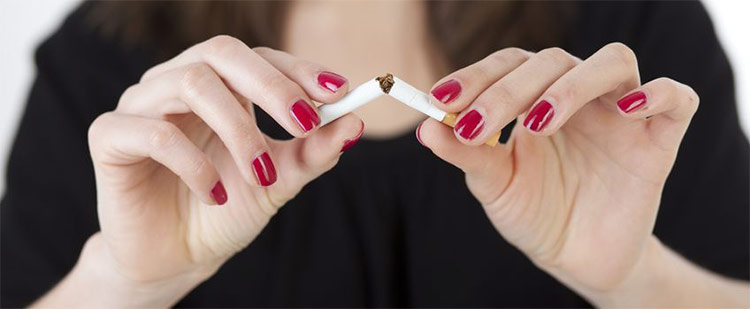Essential Oils and Aromatherapy Tips to Help Quit Smoking

As a former smoker, I intimately understand how difficult it can be to quit smoking. It requires a lot of willpower and determination, and few people are able to completely quit "cold turkey" without any discomfort or withdrawal symptoms.
Once you've quit, no matter what strategies that you used to assist you, you will have a huge reason to pat yourself on the back!
Aromatherapy is not a miracle cure that will magically eliminate all of your cravings and withdrawal symptoms and it is not a substitute for working with your doctor or qualified health care professional. But... sensibly using essential oils, with your doctor's consent, may play an especially helpful role in your effort to quit smoking.
I won't discuss all the reasons why you should quit as that goes beyond the scope of this article. As you begin to gain the willpower to quit, however, it can dramatically improve your desire to quit to read and re-read the reasons to quit... as well as focus upon all the wonderful benefits of finally being smoke-free. Focus upon how wonderful it will feel and how much better everything will smell after you have quit. I'll list several helpful links at the bottom of this article if you'd like to read more about the reasons why you should quit.

Below, I'll describe a number of essential oils and techniques including those I personally used when I quit. Combined with other smoking cessation techniques, aromatherapy may help increase your chances of quitting and staying quit.
My Experiences:
I began smoking during a profoundly stressful divorce and custody fight. I continued to smoke for eight years before I finally quit. Everyone's motives for quitting are different, but these were the motivators that made the difference for me:
- Wanting to set a good example for my daughter.
- Smoking was a direct reminder of the difficult period of my life in which I began smoking.
- Discovering aromatherapy prior to quitting. That gave me several additional aids in my fight to quit. My discovery of aromatherapy also lead me on a path of increased awareness of natural health, and that acted as a motivator as well.
- Learning of all the fillers added to cigarettes and the toxins that are emitted while smoking.
- The expense of smoking.
Tip: Once you've quit, do not cave into having "just one" cigarette. About 5 years after I originally quit, I enjoyed a cigarette with a friend during a stressful time. Big mistake. I began smoking again for a brief period. Since then, I have made it a rule to never even take a puff of another cigarette. I stick with my aromatherapy blends and techniques that greatly assist me during stressful situations.
Essential Oils That May Assist You As You Quit Smoking
Angelica Root Essential Oil
Anecdotally, Angelica Root Essential Oil can help to squelsh the emotions. Within Clinical Aromatherapy, Jane Buckle cites some small studies that indicates that Angelica Root may be beneficial to help curb nicotine cravings. [Reference: Jane Buckle, PhD, RN, Clinical Aromatherapy: Essential Oils in Healthcare (Third Edition. United Kingdom: Churchill Livingstone Elsevier, 2015), 290-293.]
Black Pepper Essential Oil
Within Clinical Aromatherapy, Jane Buckle also cites small studies that indicate that Black Pepper can help support efforts to reduce nicotine cravings and help in the efforts to quit smoking. [Reference: Jane Buckle, PhD, RN, Clinical Aromatherapy: Essential Oils in Healthcare (Third Edition. United Kingdom: Churchill Livingstone Elsevier, 2015), 290-293.] In her book Aromatherapy Science, Maria Lis-Balchin mentions a small study that may indicate that cigarette cravings may be decreased by inhaling Black Pepper Essential Oil. [Reference: Maria Lis-Balchin, Aromatherapy Science: A Guide for Healthcare Professionals (United Kingdom: Pharmaceutical Press, 2006), 101.]
Tobacco Absolute
Tobacco Absolute has the rich aroma of tobacco. During my first few days of quitting, I would place a drop of Tobacco Absolute on a fragrance blotter strip and as needed, I would raise the strip to my nose and inhale. The body movement of having the white blotter strip in my hand and raising it to my nose was a gesture somewhat similar to raising a cigarette to the mouth, so that helped. After I was smoke-free for a few days, I no longer felt the urge to do this.
Additional Essential Oils That May Help Combat Addictions and
the Cravings and Side Effects of Withdrawal Symptoms
In her book The Fragrant Mind, Valerie Ann Worwood lists these essential oils as as oils she recommends to use when combating addition:
She also lists these as essential oils that may also be helpful:
Reference: Valerie Ann Worwood, The Fragrant Mind (Novato, CA: New World Library, 1996), 119.
Make Your Own Blends Tailored to Your Specific Withdrawal Symptoms
Identify what your particular withdrawal symptoms feel like. Do you feel anxious, nervous or angry? Or perhaps during the period of quitting, you feel lethargic.
During my efforts to quit smoking, I frequently found myself reaching for the uplifting aroma of citrus oils. Their clean smell, especially that of lemon, also helped me begin to feel smoke-free more rapidly. I also found blends that include especially calming oils like Roman Chamomile to be helpful to me with the initial anxiety I felt.
Look to the Emotional Well-Being section of AromaWeb's Recipe Box to find specific combinations of essential oils that can assist you:
- Anger Reducing Blends
- Anxiety Relieving Blends
- Confidence Enhancing Blends
- Calming/Relaxing Blend
- Depression Reducing Blends
- Energizing Blends
- Fear Fighting Blends
- Grief Easing Blends
- Happiness and Peace Enhancing Blends
- Insomnia/Sleeplessness Blend
- Irritability Reducing Blends
- Loneliness Easing Blends
- Memory and Concentration Blends
- Panic and Panic Attack Blends
- Stress Reducing Blends
In addition to the particular essential oils mentioned here, enjoy using any essential oils that you personally find comforting and uplifting, but do be sure to heed any safety warnings for the oils you choose to use.
Hydrosols That May Assist With Smoking Cessation
Within her book Hydrosols: The Next Aromatherapy, Suzanne Catty recommends Neroli Hydrosol to help with detoxification and a combination of Labrador Tea (Ledum groenlandicum) and Yarrow hydrosols to help with withdrawal symptoms.
Methods of Application Best Suited for Smoking Cessation
Aromatherapy Inhalers

Aromatherapy inhalers enclose a concentrated amount of essential oil. To use one, you simply unscrew the cap and raise the tip of the inhaler to your nose. They can be transported in your purse, briefcase or backpack and are even small enough to fit in a pocket. They allow you to use your chosen essential oils anywhere. Some aromatherapy retailers offer ready-made aromatherapy inhalers that contain a single essential oil or a specially formulated blend of essential oils. You can also find the 4-part housing blanks (the exterior, the cover, the bottom cap and the foam insert that holds the oil) from some vendors. I know that long-time AromaWeb advertiser Nature's Gift sells them, and others may as well. It's simple to add your own essential oils to the insert and takes only a matter of a minute or two. (Also see the Breathing Deeply section below). For more information, read AromaWeb's Aromatherapy and Essential Oil Inhaler article.
The action of using an aromatherapy inhaler to raise the aroma to your nose can help to curb the hand-to-mouth aspect of smoking cigarettes. Breathing in the aroma from the inhaler also mirrors inhaling deeply when smoking.
Room Diffusion
When quitting, I especially liked using my candle diffuser and nebulizer to disperse my chosen essential oils throughout the room. For information on aromatherapy diffusers, read AromaWeb's All About Diffusers article.
Other Aromatherapy Methods
Other essential oil methods of application can also be used to complement your smoking cessation program. Essential oils safe for use on the skin and used in low dilutions can be used in a massage oil or bath oil or used to make aromatic bath salts. Remember that essential oils should never be added directly to bathwater.
Essential Oils to Help Eliminate Smoky Odors from Rooms
Other Smoking Cessation Tips
Breathing Deeply
Smoking is a multi-faceted habit. You not only become addicted to the nicotine (and the other addictive fillers that may be incorporated into the brand you smoke), but you also develop the habit of raising the cigarette to your mouth (hand activity) and also breathing deeply. Breathing deeply when stressed is actually a good thing, but do it without the cigarette in your mouth. Anytime you crave a cigarette, inhale as deeply as if you are taking a puff from a cigarette and then slowly exhale. The added oxygen is nourishing to your body and can help to relieve stress. I don't have empirical evidence, but from my own experience, using an aromatherapy inhaler while trying to quit is quite helpful (see above section).
Working Out/Walking/Jogging
As I quit, I experienced anxiety/nervous energy. Working out helped me release that anxiety and kept me from gaining weight. Check with your doctor about what level of actively you can safely perform as you quit smoking.
Support of Friends and Family
When you are planning to quit, it helps to let your friends and loved ones know. Prepare them that you might be edgy for a little while. If some friends or family members typically offer you a cigarette anytime they light up, politely ask them to no longer do so and gently remind them when necessary as automatically offering cigarettes to loved ones also is a habit. It's powerful and enabling to be able to say "no," but you don't need the added temptation during your first couple weeks while you are enduring withdrawal symptoms. Prepare yourself that some smoking friends and family members may not be supportive or may struggle because your success can make them feel inferior for not being able to quit. Also prepare yourself for non-smoking loved ones to sometimes get rude as well because they don't understand how difficult it can be to quit. If you need to and have the ability, temporarily distance yourself from negative individuals as you work on quitting, and lean towards those who are especially supportive.
Additional Resources and Help
For many other smoking cessation aids and techniques, check out this link:
http://www.nlm.nih.gov/medlineplus/quittingsmoking.html
For reasons to quit, view the following pages or do a search on the phrase Reasons to Quit Smoking:
